On Monday, a U.S. federal judge ruled that Google has unlawfully maintained a monopoly in two key areas: search and text advertising. This decision stems from a landmark antitrust case filed by the government in 2020, which accused Google of sustaining its dominance in the general search market through restrictive practices and a self-reinforcing feedback loop. The court found that Google violated Section 2 of the Sherman Act, which prohibits monopolistic practices.
This ruling represents the first major anti-monopoly verdict against a tech company in decades. Judge Amit Mehta of the U.S. District Court for the District of Columbia declared, “Google is a monopolist, and it has acted as one to maintain its monopoly.”
The Department of Justice, along with a bipartisan coalition of attorneys general from 38 states and territories, including Colorado and Nebraska, had filed similar antitrust lawsuits against Google in 2020. These suits were consolidated for pretrial proceedings such as evidence discovery.
Attorney General Merrick Garland described the ruling as a “historic win for the American people,” emphasizing, “No company — no matter how large or influential — is above the law.” He assured that the Justice Department would continue to robustly enforce antitrust regulations.
The court’s decision highlighted Google’s exclusive search agreements on Android and Apple devices, which it said contributed to Google’s monopolistic behavior and dominance in search markets. The ruling found that Google operated as a monopoly in general search services, which involves its core search engine, and in general search text advertising, which includes text ads alongside search results. However, the court determined that general search advertising does not constitute a separate market and therefore cannot be considered monopolistic.
Google’s President of Global Affairs, Kent Walker, announced the company’s intention to appeal the decision, noting that the court acknowledged the quality of Google’s search engine but concluded that its availability should be restricted. “As this process continues, we will remain focused on making products that people find helpful and easy to use,” Walker stated.
Following the announcement, Alphabet’s shares dropped more than 4%, contributing to a broader global stock market decline.

